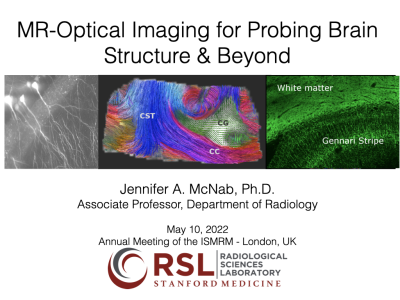Weekday Course
Multimodal Imaging & Data Analysis
Joint Annual Meeting ISMRM-ESMRMB & ISMRT 31st Annual Meeting • 07-12 May 2022 • London, UK

| Multimodal Imaging I | |||
| 14:50 | MRI-Guided Focused Ultrasound as a Tool for Treating Cancer
Viola Rieke
|
||
| Multimodal Imaging II | |||
| 15:10 |  |
MR-Optical Imaging for Probing Brain Structure & Beyond
Jennifer McNab
Comparing MRI results in postmortem tissues with optical imaging of fluorescently labeled histological features in the same 3D intact tissue is a way to improve the interpretation of MRI data. This talk will describe various approaches to performing these types of comparisons including postmortem MRI and tissue clearing methods, as well as, feature extraction and co-registration considerations.
|
|
| 15:30 | MRI-MEG: Leveraging Complementary Information for Studying Brain Connectivity
Timothy Roberts
This work discusses integration of DTI and related measures of white matter microstructure with temporal measures of evoked response latency from MEG to attempt to identify (1) neural correlates of development and their biological basis, (2) departures from typical development in autism spectrum disorder and related genetic syndromes and (3) a biological basis for stratifying sub-populations of these heterogeneous disorders.
|
||
| 15:50 | Modeling Neurological Disorders with Brain Connectivity & PET Imaging
Ashish Raj
|
||
The International Society for Magnetic Resonance in Medicine is accredited by the Accreditation Council for Continuing Medical Education to provide continuing medical education for physicians.